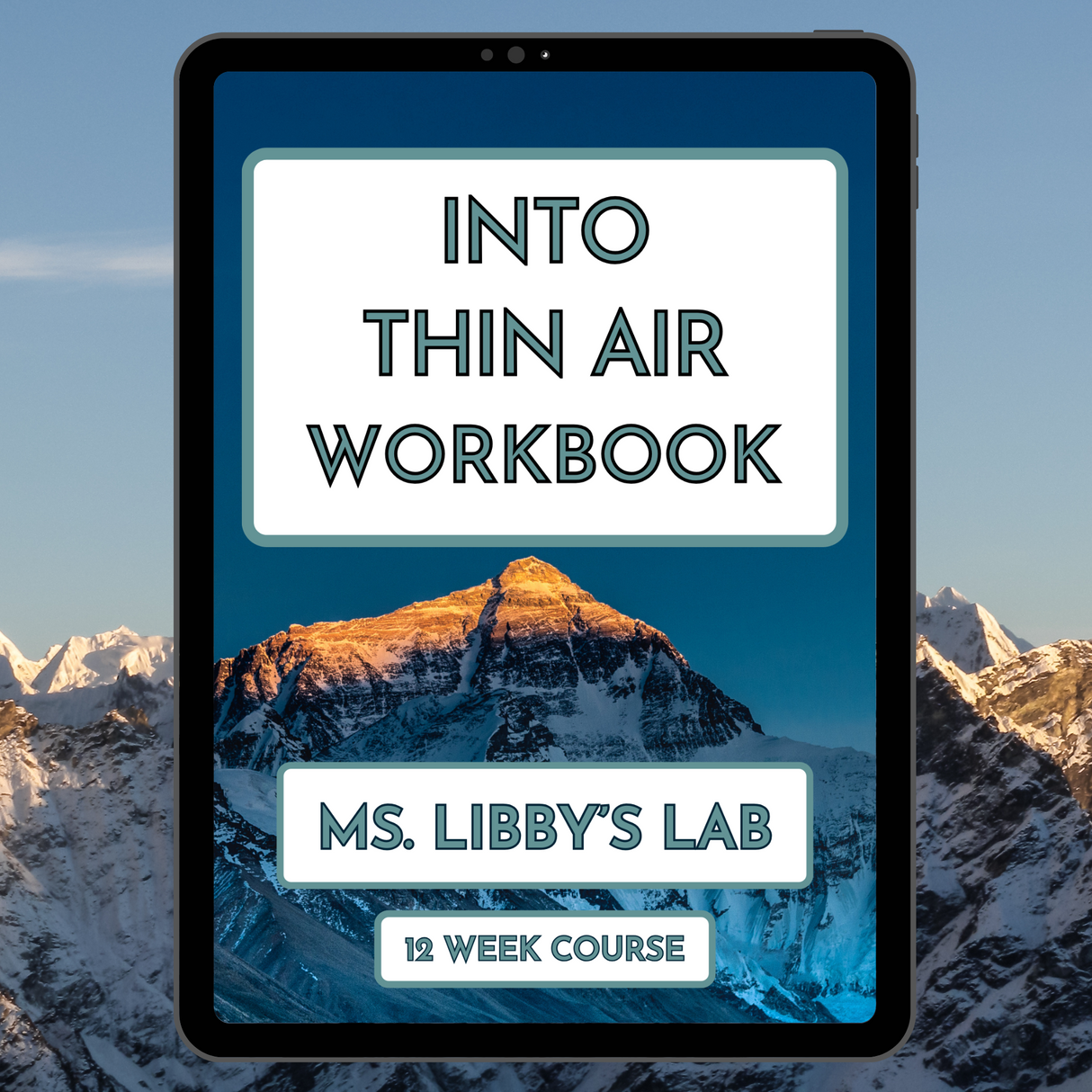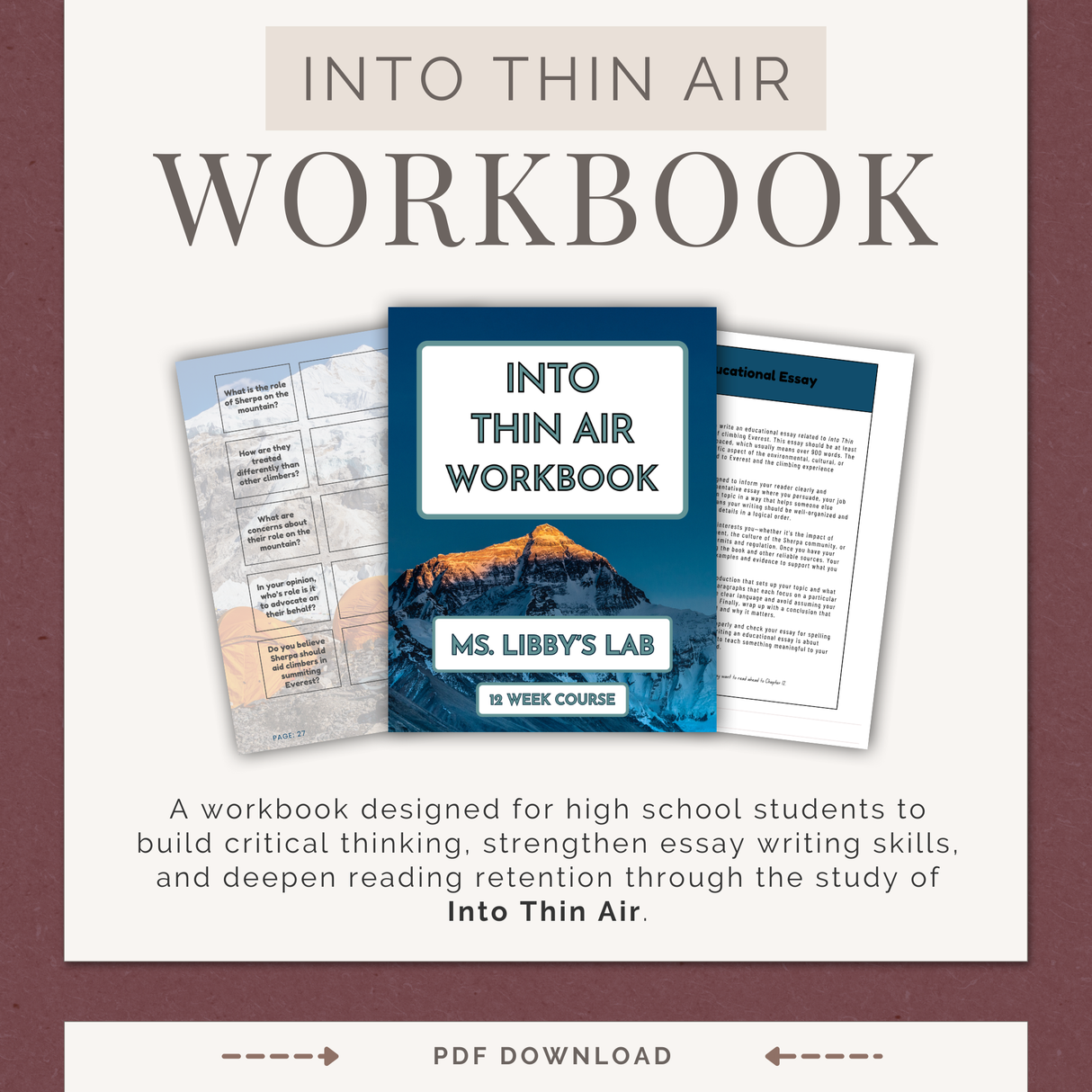Into Thin Air Workbook with Essay Review with Ms. Libby
Into Thin Air Workbook with Essay Review with Ms. Libby is backordered and will ship as soon as it is back in stock.
Couldn't load pickup availability
Into Thin Air Workbook with Essay Review with Ms. Libby
Full Course
Recommended for Grades 9-12
Designed for self-directed learning, estimated time: 2 hours a day, 5 days a week, for 12 weeks.
Warning: This book discusses the deaths of climbers on Mount Everest, language, and cannabis reference.
Into Thin Air by Jon Krakauer offers a firsthand narrative of the 1996 Mount Everest disaster, recounting the author's personal experience and the tragic events that unfolded during a high-altitude expedition. As Krakauer reflects on the extreme dangers faced by climbers and the psychological and physical tolls of mountaineering, he delves into the larger issues of human ambition, competition, and the complex dynamics of extreme environments. The book combines a gripping adventure story with an in-depth exploration of the ethics and risks of modern mountaineering.
In this workbook, students will engage with the book's themes and develop key skills, including:
- Identifying Themes: Analyze the central themes of the book, such as ambition, survival, and the human cost of extreme pursuits.
- Argumentative Essay Writing: Learn to develop strong arguments and support them with evidence from the text through both short and long essays.
- Geography: Study the geography of Mount Everest and its impact on the climbers' experiences.
- Cultural Conflict: Examine the cultural challenges that climbers face in such an extreme environment and their interactions with local Sherpas.
- Mountaineering Conflict: Explore the internal and external conflicts faced by climbers as they battle the mountain, the elements, and their own limits.
- Nonfiction Writing and Storytelling: Analyze Krakauer’s narrative techniques and understand how nonfiction storytelling can create a compelling, engaging story.
- Researching: Conduct research on the history of climbing on Mount Everest and the ethics of high-altitude expeditions.
Additional Learning Objectives:
- Literary Analysis: Students will deepen their understanding of literary devices used in nonfiction, including symbolism, imagery, tone, and foreshadowing. They will explore how Krakauer uses these elements to enhance the narrative and create a sense of tension, drama, and reflection.
- Narrative Perspective: Students will analyze Krakauer's use of a first-person narrative, discussing how his personal involvement in the events influences the storytelling. They will examine the impact of subjectivity on the reliability of the narrator and the challenges of writing about personal tragedy.
- Character Study: Students will engage in character analysis, both of Krakauer himself and of the climbers featured in the book. They will explore the motivations, conflicts, and decision-making processes of key individuals, considering how their actions and personalities shape the outcome of the story.
- Ethical Dilemmas: Students will explore the ethical issues raised in the book, such as the commercialization of Everest expeditions, the treatment of local Sherpas, and the decision-making that led to climbers pushing beyond their limits despite dangerous conditions. This will involve critical thinking about moral responsibility and the value of human life.
- Tone and Mood: Students will explore how Krakauer sets the tone and mood throughout the book, especially in relation to the tragic events that unfold. They will analyze how language choices, pacing, and imagery contribute to creating a sense of suspense and empathy.
- Contextual Research: Students will investigate the history of Mount Everest expeditions, the evolution of climbing technology, and the risks involved in high-altitude mountaineering. This research will help them contextualize the events of the book and understand the broader implications of climbing in the modern world.
- Creative Writing: As a creative exercise, students will write a fictional story or poem, drawing on the themes in Into Thin Air. This encourages students to use descriptive language and write in a way that creates art from art.
Throughout the course, students will strengthen their writing skills by completing a variety of short and long essays, answering thought-provoking prompts, and engaging in activities designed to assess and develop their reading aptitude. These exercises will deepen their understanding of both the text and the broader issues surrounding mountaineering and survival in extreme conditions. By the end of the course, students will have sharpened their analytical thinking, writing abilities, and critical engagement with nonfiction literature.
Essay Review with Ms. Libby
Essay Review with Ms. Libby is designed to accompany the Into Thin Air course. Students will complete the same major writing assignments from the workbook—the educational essays, the argumentative essays, and the creative writing project—but will also receive direct feedback and mentorship from Ms. Libby.
Students submit their essays to Ms. Libby and receive detailed written feedback on content, structure, clarity, and style. They may resubmit revised drafts multiple times, allowing them to experience a professional writing process that emphasizes revision and growth. The focus of this product is to strengthen analytical thinking, sharpen argumentative writing, and develop a confident narrative voice in creative work.
This offering does not cover the shorter reflection responses within the workbook, but instead concentrates on the larger assignments where structured feedback and revision are most valuable. By the end of the course, students who work with Ms. Libby will have gained both stronger essays and a deeper understanding of how to revise, refine, and polish their writing for maximum impact.
*This is a digital download. Copy of Into Thin Air book not included.
FAQ:
Why is the course 2 hours a day?
This is a general time estimate. Students read and work at different paces and have different reading competition levels. While one student may read through the text quickly and be able to answer to questions without review, another student may have to refer back to the text when answering the critique thinking, reflective, and reading comprehension questions. This course also touches on multiple educational components such as critical thinking, creative writing, and geography, the time estimate allows for that.
We aren’t ready to start this unit just yet, is it ok if we wait to begin sending work?
This product is a digital download. You may begin this course at any time.
This course wasn’t for my student, may I return it?
These materials are delivered as digital downloads and cannot be returned or refunded. All sales are final.





